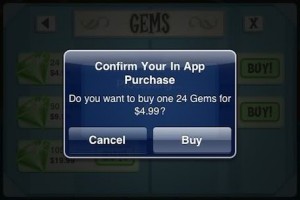Apple and the Federal Trade Commission announced the tech giant would refund at least $32.5 million in app purchases made by children without their parent’s consent, ending the first federal action focused on children’s app use and spending.
The FTC hailed Wednesday’s consent decree as a victory for consumers hurt by Apple’s “unfair” App Store policies.
“This settlement is … a signal to the business community: whether you’re doing business in the mobile arena or the mall down the street, fundamental consumer protections apply,” said FTC Chairwoman Edith Ramirez. “You cannot charge consumers for purchases they did not authorize.”
The focus of the investigation was Apple’s policy of allowing App Store customers to enter their password once and then be able to make multiple purchases without re-entering their password for the next 15 minutes.
The FTC found that children were able to make purchases without the parent’s knowledge during that window.
The decision raised new questions around the appropriateness of using in-app purchases within games focused on children. Many developers have turned to in-app spending as a major revenue model for their products, since they allow game companies to make additional revenue from a game after any initial download.
Most stores now offer parents fairly robust controls over in-app purchases and most developers have been quick to push these controls so as to allow for continued monetization of apps.
As part of its multitude of statements connected to this case, the FTC’s Lesley Fair had explicit advice for companies that produced content for children.
First, get people’s express consent before billing them. That’s Consumer Protection 101 for app developers, app sellers, advertisers, payment processors, and anyone else in the marketing ecosystem who wants to avoid the scrutiny of law enforcers and the ire of outraged consumers.
Second, especially when it comes to merchandise geared toward kids, think through your processes in advance to minimize the risk that a child’s quick click could result in hefty unauthorized charges unknown to the parent until they get the bill.
Lesley Fair, Federal Trade Commission
Apple: We were already responding
Apple denied any “unfair billing practices,” saying in a memo from CEO Tim Cook to employees that since the iTunes Store opened in 2008, “The 15-minute window … was aimed at making the App Store easy to use… We heard from some customers with children that it was too easy to make in-app purchases, so we moved quickly to make improvements. We even created additional steps in the purchasing process, because these steps are so helpful to parents.”
In 2011, Apple ended the policy of allowing unlimited charges in that 15-minute window.
Apple had also settled a class action lawsuit from five parents in June 2013 connected to the same charges. The FTC then took up the case to ensure that Apple was addressing the problem and had threatened a lawsuit. Cook, in the same memo said facing a second legal action – this time from the government – didn’t “seem right.”
“To us, it smacked of double jeopardy,” Cook wrote. “However, the consent decree the FTC proposed does not require us to do anything we weren’t already going to do, so we decided to accept it rather than take on a long and distracting legal fight.”
In that initial case, Apple agreed to include a notice in the App Store for apps that included in-app purchases and offered a $5 iTunes card for as many at 23 million users.
Convenience versus control
Not all of the FTC members saw Wednesday’s settlement as a good move. Joshua Wright, the newest member of the panel who started last January, said the Commission hadn’t demonstrated that Apple’s moves had caused significant harm.
His case is one that many within the app making community would agree with – namely that the tiny percentage of people who saw their kids spend money in the app store in the 15-minute window after the entering of a password was far outweighed by the convenience of not having to re-enter your password for every purchase.
“[A]lthough Apple’s allegedly unfair act or practice has harmed some consumers, I do not believe the Commission has demonstrated the injury is substantial,” Wright wrote in a dissenting note. “More importantly, any injury to consumers flowing from Apple’s choice of disclosure and billing practices is outweighed considerably by the benefits to competition and to consumers that flow from the same practice.”
Indeed, the amount of money flowing through the App Store, Google Play and other mobile purchasing platforms has exploded in recent years.
In 2013, Gartner Research projected that there were 102 billion downloads and more than $26 billion in revenue.

